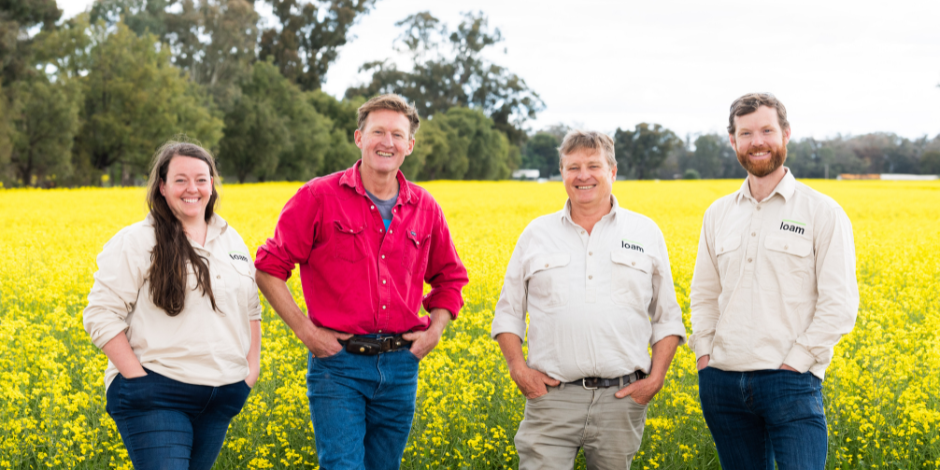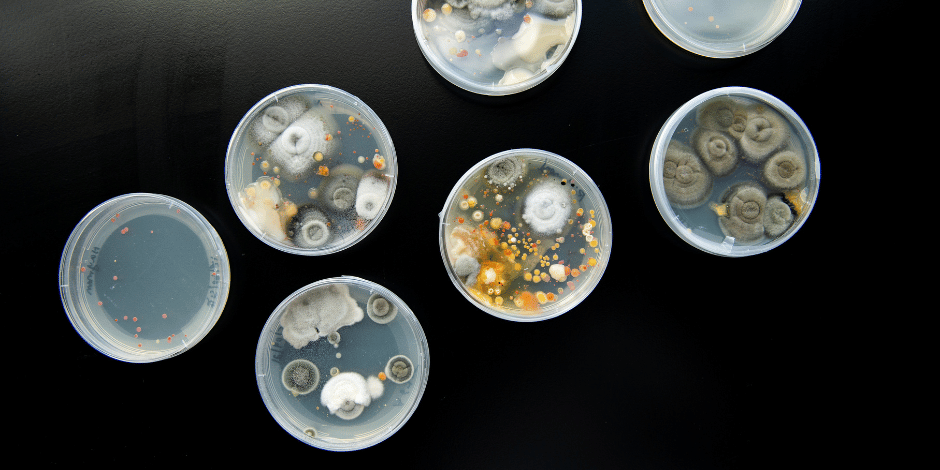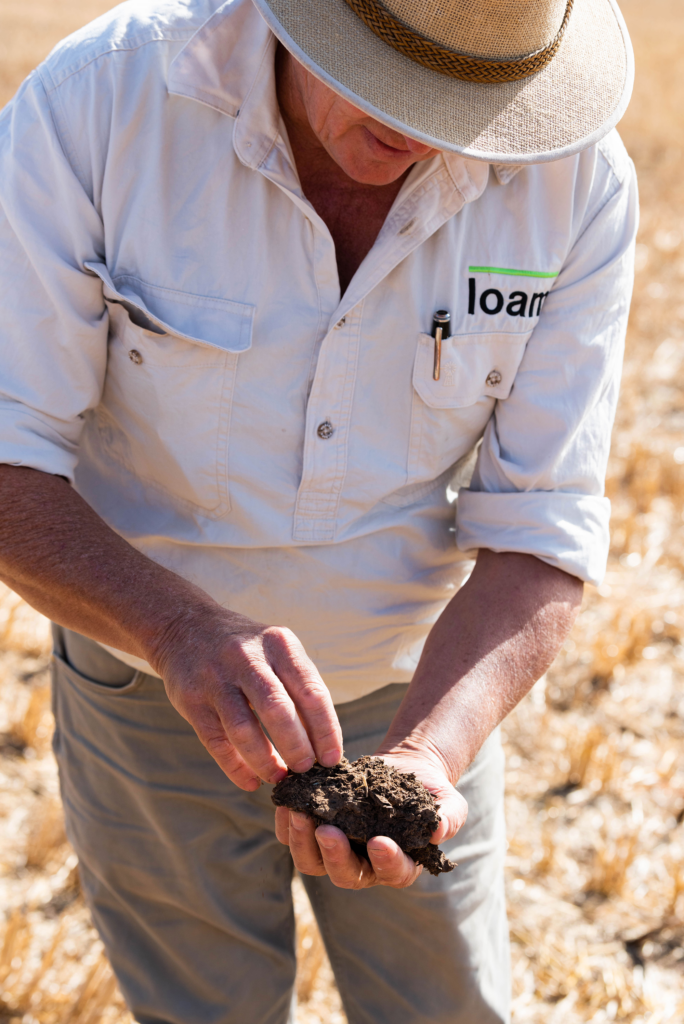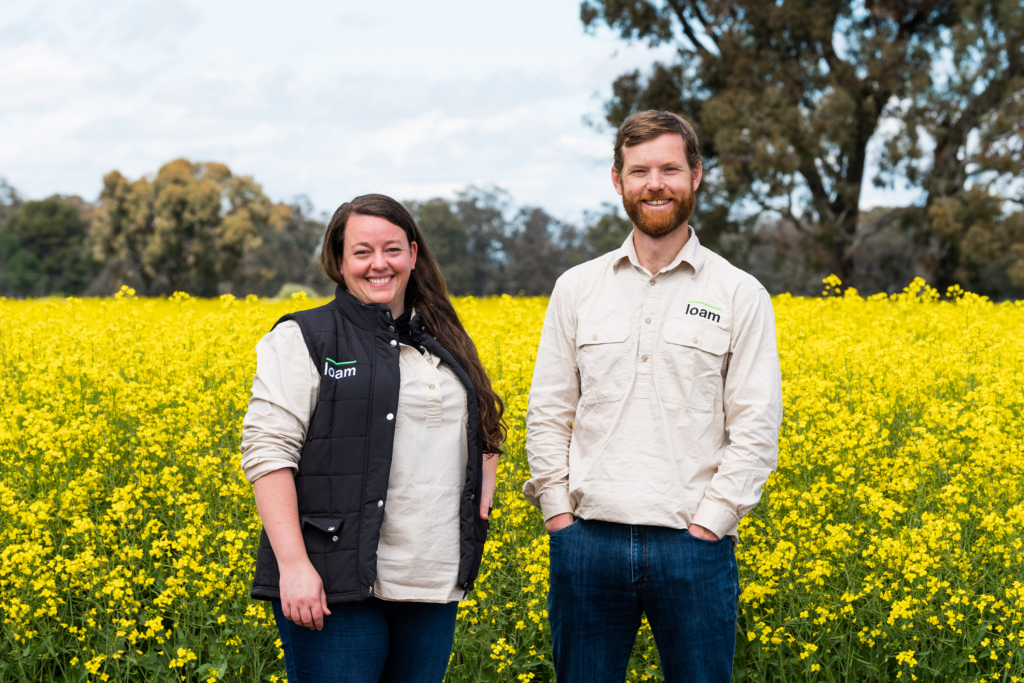Loam launches CarbonBuilder tech to tackle climate change
Between a growing global population and the effects of extreme weather events, food security and climate change are intrinsically linked.
One Aussie startup is putting agriculture at the centre of the fight against climate change, using microbial technology to remove carbon from the atmosphere and boosting soil quality for farmers – at the same time.
 Loam Co-Founders (left to right) Tegan Nock, CPO, Mick Wettenhall, Guy Webb, Global Head of Agronomy, Guy Hudson, CEO at Canowindra, NSW. Photo by Rachael Lenehan Photography.
Loam Co-Founders (left to right) Tegan Nock, CPO, Mick Wettenhall, Guy Webb, Global Head of Agronomy, Guy Hudson, CEO at Canowindra, NSW. Photo by Rachael Lenehan Photography.
After years of research and collaboration with the farming community, Loam has launched its CarbonBuilder product to Australian farmers. The launch comes at the same time as a huge cash injection of $105 million in Series B funding, allowing the founders to expand product development and ramp up their commercial pipeline.
RELATED: Loam Bio raises $75m USD, launches tools to improve soil carbon capture
Through rigorous and meticulous research, the Loam team identified a specific microbe that could be introduced to crop seeds en masse. Once those plants are growing, the microbe allows them to more effectively collect and store carbon dioxide from the air.

Loam Bio microbes Photo credit: Monique Lovick
In a typical growing cycle, once a plant dies or is harvested, that carbon dioxide would be released back into the atmosphere. However, CarbonBuilder makes the carbon storage more stable, meaning it remains in the soil – and out of the atmosphere.
It’s carbon sequestration at a potentially enormous scale, which is a huge win for the environment. But carbon-rich soil also means more yield and reduces the risk for farmers.
Ultimately, the product is designed to leave soil in a better condition not only for the next crop, but for the next generation.
A carbon boost for Australian farmers
According to Loam Co-Founder and Chief Product Officer Tegan Nock, building soil carbon traditionally takes time, money and a lot of practice for farmers. These barriers can prevent them from taking part in carbon capture projects.
CarbonBuilder is designed to be a simple place to start, Ms Nock said, offering practicality for adoption as well as economic benefit.
“You don’t have to change practices dramatically to start on the carbon farming process, and Loam’s technology enables more growers to step into this space,” she explains.
“There’s not been a technology like it in the marketplace before, and it presents a unique value proposition for farmers.”
CarbonBuilder has launched alongside Loam’s SecondCrop carbon project system, whereby the startup works with farmers to understand their own carbon footprint, as well as the value of carbon as a commodity in itself.
As a rule, farmers know the benefits of having more carbon in their soil, says Guy Webb, Loam Co-Founder and Head of Agronomy.

Guy Webb, co-founder Loam Bio, on farm at Wirrinya NSW. Photo by Rachael Lenehan
SecondCrop is designed to provide farmer-friendly pathways to carbon projects, with more support and more flexibility.
“Providing farmers with more transparent carbon project options and new technologies will enable the greatest agronomic and climate outcomes,” Mr Webb explains.
“Carbon is the only commodity that you get paid for that doesn’t leave the farm gate. The carbon stays in the soil and continues to benefit your farming practices.”
Since the onset of industrial agriculture, Webb says carbon in cropping soils globally has declined by about 40%. He believes Loam offers a solution to reverse that.
Being able to move CO2 from the atmosphere – where it is causing harm – into the earth can improve resilience and productivity of food production systems in Australia and around the world.
“It’s exciting that agriculture can be part of the solution to a massive global problem, in a real way,” said Mr Webb.
A funding win for Loam
Having started out as a not-for-profit research project, Loam quickly grew into an opportunity that could make a global impact.
RELATED: Why investing in soil makes good business sense
When it comes to sustainable farming, it’s the products that are practical and genuinely valuable to the farmers that will create real change.
The team just needed the capital to make it happen.
Loam has since announced its $105 million Series B funding round, co-led by Lowercarbon Capital and Wollemi Capital, and also including backing from Horizons Ventures, Acre Venture partners, Main Sequence, the Clean Energy Finance Corporation and Grok Ventures.
The funding brings Loam’s total capital raised to $150 million to date, making it the most-funded Australian agritech startup to date.
RELATED: Asia-Pacific’s vibrant agrifood tech startups geared to decarbonise the region
Microbiology to tackle climate change
Loam’s technology comes in the form of an inoculum, which is a beneficial fungi introduced to the seed of a particular crop. The beneficial microbes work at the root of the growing plant to boost carbon collection and storage.
Loam Co-Founder and Chief Executive Guy Hudson believes microbial science has an “enormous role to play” in tackling climate change on a large scale.

Loam Co-founders Tegan Nock (CPO) and Guy Hudson (CEO). Photo by Rachael Lenehan Photography
And this may just be the beginning.
“The role of beneficial fungi in agriculture has been hugely underexplored,” said Mr Hudson.
“We’re only just starting to understand how important these organisms are in the ecosystem.”
Enjoyed this story? Want to learn more about the Asia Pacific region’s innovative agrifood tech ecosystem? Sign up for our newsletter here and receive fresh stories about global leaders, farmers, startups and innovators driving collaborative change.
